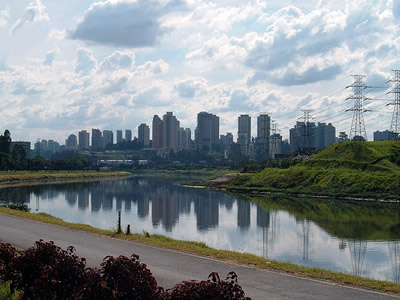ECLAC Promotes Development of Sustainable Cities in the Region through Expert Forum
Photo: Diego Torres Silvestre, Flickr
More than 60 professionals from Latin America and the Caribbean will take part in an expert forum on the development of sustainable cities in the region, which includes a distance-learning course and two face-to-face seminars in Buenos Aires, Argentina, and Valdivia, Chile.
The aim of this initiative from the Sustainable Development and Human Settlements Division of ECLAC and the Spanish Agency for International Development Cooperation (AECID) is capacity-building in the design of plans, studies and projects for city development among professionals and authorities in Latin America and the Caribbean.
During the process, the experts are expected to adopt new eco-efficiency tools, criteria and approaches for low-carbon urban development.
The first international seminar of the expert forum, entitled Low-carbon pathways for the development of sustainable cities in Latin America and the Caribbean, was programmed to be held in the Argentine capital on 1 and 2 August 2012, while the second will be held in the south Chilean city of Valdivia on 16 and 17 October.
The forum will be led by a “Group of 11” town planners from 10 Latin American and Caribbean cities (ten women and one man), who will take part in the distance learning and present at the face-to-face seminars.
They come from the Province of Buenos Aires and the city of Córdoba (Argentina), from São Paolo (Brazil), Santiago and Valdivia (Chile), Antioquia and Bogotá (Colombia), Guatemala City (Guatemala), Mexico City (Mexico) and Lima (Peru).
The other 50 regional experts registered will participate in the forum through the ECLAC e-learning platform.
The modules on the course include ones on eco-efficiency and sustainable urban infrastructure; sustainable city planning and climate change; urban design towards low-carbon development pathways; strategic environmental assessment and fiscal, technological and regulatory instruments for solid waste, water, sanitation and housing.
Although the forum is officially scheduled to end in October, it is hoped that the initiative will continue through technical cooperation agreements with other institutions working to develop low-carbon cities in Latin America and the Caribbean.
More IN FOCUS
Map of Child Poverty among the Region's Indigenous and
Afrodescendent Peoples
Growing Importance of Outsourcing in Latin America and the Caribbean
Women's Autonomy, Overview of Four of the Region's Countries
| The forum will be led by a “Group of 11” town planners from 10 Latin American and Caribbean cities, who will take part in the distance learning and present at the face-to-face seminars. | |
| Although the forum is officially scheduled to end in October, it is hoped that the
initiative will continue through technical cooperation agreements with other institutions working to
develop low-carbon cities in Latin America and the Caribbean. |
|
